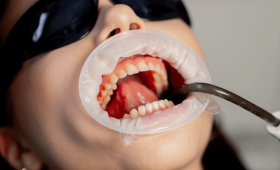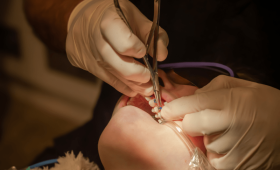What are Dental Veneers?
Dental veneers are thin porcelain or composite sheets that are bonded to the front surface of the teeth to correct aesthetic and functional problems. With these applications, defects in the color, shape, size, and alignment of the teeth are corrected. They are especially preferred to achieve an aesthetic appearance in discolored, broken, cracked, spaced, or slightly crooked teeth. Dental veneers can be applied with a minimally invasive method and give results that are very close to the natural tooth appearance.
Who is a Suitable Candidate for Dental Veneers?
Dental veneers are suitable for individuals who have good general oral and dental health and have aesthetic concerns. Especially people with permanent stains, broken or cracked teeth, gaps, shape deformities, or slight crookedness can benefit from this procedure. It is also an effective solution for patients who have not achieved results from teeth whitening procedures. For patients who have habits such as teeth grinding or have serious decay, additional treatments may be necessary before getting veneers.
What are the Types of Dental Veneers?
Dental veneers are mainly divided into two main groups: porcelain veneers (laminate veneer) and composite veneers. Porcelain veneers are thin porcelain sheets prepared in a dental laboratory. Composite veneers, on the other hand, are filling materials that are applied directly to the tooth by the dentist. Both types have advantages and disadvantages. While porcelain veneers are more durable, stain-resistant, and offer a more natural look, composite veneers are more affordable and can be completed in a single session.
How are Porcelain Veneers Made?
The porcelain veneer procedure usually consists of several sessions. In the first session, a minimal abrasion is made on the front surface of the teeth. This abrasion ensures that the veneer fits perfectly on the tooth and gives it a natural appearance. Then, an impression of the teeth is taken and sent to the laboratory. Custom porcelain veneers are prepared in the laboratory environment. In the second session, the veneers are permanently bonded to the teeth with a special adhesive.
How are Composite Veneers Made?
Composite veneers are a procedure that can be completed in a single session. In this method, the dentist directly applies a special filling material called composite resin to the tooth and shapes it. After the material hardens, it is polished. In this way, the color, shape, and size of the tooth are improved. Composite veneers can be applied in a shorter time and at a more affordable cost compared to other types of veneers. However, they are more prone to staining and abrasion than porcelain veneers.
What are the Differences Between Porcelain and Composite Veneers?
The main differences between porcelain and composite veneers are the material used, durability, and aesthetic quality. Porcelain veneers have a more natural shine and aesthetic appearance because they are specially prepared in a laboratory. They are stain-resistant and long-lasting. Composite veneers, on the other hand, are a more affordable material that can be applied in a single session but can change color over time and are less durable. Therefore, which type of veneer is chosen depends on the patient’s expectations, budget, and the dentist’s recommendation.
How Long Does the Veneer Procedure Take?
The duration of the dental veneer procedure varies according to the type of veneer chosen. Composite veneers are usually completed within a single session, which is about 1-2 hours. Porcelain veneers take longer because they require a laboratory process. This process is usually completed in 2-3 sessions and a total of about 1 week. Temporary teeth can be placed on the patient during this time.
Is There Any Pain or Discomfort?
During the dental veneer procedure, there is generally no pain or discomfort because local anesthesia is applied. The procedure is quite comfortable for most patients as a minimal abrasion is made on the front surface of the tooth. After the procedure, there may be slight sensitivity or a feeling of soreness, but this usually goes away on its own within a few days and can be easily controlled with over-the-counter painkillers.
Is the Veneer Procedure Permanent?
The dental veneer procedure is a permanent aesthetic solution, but veneers have a lifespan. While porcelain veneers can last for 10-15 years or longer with proper care, the lifespan of composite veneers is generally 5-7 years. Regular dental check-ups and good oral hygiene are of great importance to extend the lifespan of the veneers.
What is the Lifespan of Veneers?
The lifespan of veneers depends on the material used, oral hygiene, and the patient’s habits. Porcelain veneers can be used for 10-15 years thanks to their hard and stain-resistant structure. Since composite veneers are less durable than porcelain, their lifespan is around 5-7 years. Regular brushing, flossing, and dentist visits extend the life of the veneers.
Can Veneers Fall Off?
Since dental veneers are fixed to the teeth with a special and very strong adhesive, the possibility of them falling off is quite low. However, biting a hard food, a blow to the teeth, or habits such as teeth grinding can cause the veneers to break or dislodge. In such a case, you can contact your dentist to have your veneer re-bonded or replaced.
Do Veneers Stain My Teeth?
No, dental veneers do not stain teeth. Especially porcelain veneers have a structure that is stain-resistant and retains their color. Colored substances like tea, coffee, or cigarettes do not easily stain the surface of the veneers. However, the natural enamel structure of the veneered tooth can yellow over time. Therefore, the teeth other than the veneers may need to be whitened.
Do Veneers Harm My Teeth?
When applied correctly, dental veneers do not harm the teeth. For porcelain veneers, a very thin layer of enamel tissue is abraded from the front surface of the tooth. This process ensures that the veneer integrates with the natural tooth. In composite veneers, this abrasion may not be necessary. The choice of dentist and the quality of the application are very important to protect the health of the teeth.
How are Teeth Prepared Before Veneers?
Before porcelain veneers, a micron-level thin layer of enamel is abraded from the front surface of the teeth. This process prevents the veneer from creating thickness on the tooth and provides a natural look. Before composite veneers, this abrasion is usually not necessary, but the tooth surface is prepared with a special gel to ensure the material adheres better. In both cases, the teeth are sterilized and dried.
How Many Sessions are Needed for Veneers?
For composite veneers, a single session is usually sufficient. This procedure can be completed immediately in the dentist’s office. Porcelain veneers, on the other hand, require at least two sessions. In the first session, the teeth are prepared and impressions are taken, and in the second session, the veneers prepared in the laboratory are bonded to the teeth. Sometimes, try-in sessions can also be added.
Is There an Age Limit for Veneers?
Although there is no definite age limit for dental veneers, the development of the jaw and teeth must be completed. This is generally the case for individuals aged 18 and over. In young people, especially children and adolescents in their growth stage, veneer applications are generally not recommended because the tooth and jaw structure is still changing. This is an important criterion for obtaining permanent results.
Can Veneers Be Applied to a Single Tooth?
Yes, dental veneers can be applied to a single tooth. This method is often preferred to provide an aesthetic improvement in a single tooth that is broken, cracked, or has a shape deformity. When the color or size of a single tooth is incompatible with other teeth, this problem can also be corrected with a veneer. The dentist tries to ensure the best color and shape harmony of the veneer with the other teeth.

Do Veneers Cover Tooth Decay?
Dental veneers are used to correct aesthetic problems, but they are not sufficient to cover active tooth decay. Before starting the veneer application, all tooth decay must be cleaned and necessary fillings or root canal treatments must be completed. The veneer should only be applied to a healthy tooth surface, which is essential for the success of the procedure and the protection of tooth health.
How Should Oral Care Be After Veneers?
Oral care after veneers is of vital importance to extend the life of the veneers and maintain oral health. Regular brushing, at least twice a day, is important. Flossing is also necessary to clean the spaces between the veneers and teeth. Alcohol-containing mouthwashes should be avoided, as they can damage some veneer materials.
Do Veneers Get Stained?
Porcelain veneers are highly resistant to staining thanks to their smooth and non-porous surfaces. Colored substances like tea, coffee, red wine, or cigarettes do not easily affect the color of porcelain veneers. Composite veneers, on the other hand, have a more porous structure than porcelain, so they may show slight staining over time.
Are There Any Food Restrictions After Veneers?
For the first few days after the veneer procedure, it is a good idea to avoid very hot or very cold foods. It is especially recommended to stay away from hard and sticky foods for the first 24 hours after the porcelain veneers are bonded. This ensures that the veneer adheres fully to the tooth. It is also important to avoid colored foods and drinks on the first day with composite veneers.
What Should I Do If My Veneers Break?
Dental veneers can break when they receive a hard blow or are under excessive pressure. In such a case, try to save the broken pieces and make an appointment with your dentist immediately. Porcelain veneers cannot be repaired and need to be replaced, while composite veneers can usually be easily repaired.
What Factors Affect the Price of Veneers?
The price of veneers varies depending on the type of material used (porcelain or composite), the number of teeth to be treated, the dentist’s experience, and the city where the clinic is located. Porcelain veneers are more costly than composite veneers. The most accurate information about the treatment plan and pricing is clarified during your first consultation with your dentist.
Does the Veneer Procedure Cause Permanent Pain?
No, the dental veneer procedure does not cause permanent pain. The sensitivity felt after the procedure is usually short-lived and disappears as the teeth get used to the new structure. If the pain persists or worsens, it could be a sign of an infection or incompatibility, and you should contact your dentist immediately.
Can Gum Diseases Be Treated with Veneers?
Dental veneers do not treat existing gum diseases. Before starting the veneer procedure, all gum diseases must be treated and the gums must be healthy. Veneers applied to unhealthy gums can increase gum inflammation and shorten the lifespan of the veneers.
Can Veneers Be an Alternative to Orthodontic Treatment?
Dental veneers can be an aesthetic alternative to orthodontic treatment in cases such as slight crookedness, gaps between teeth, or small tooth shape deformities. However, in cases of serious crookedness and jaw incompatibility, orthodontic treatment is still the most effective solution. Your dentist will help you decide which method is most suitable for you.
What is a Hollywood Smile?
A Hollywood smile is a smile design concept in aesthetic dentistry where all teeth are ideally white, of ideal size and shape, and arranged perfectly. This design aims to create the most aesthetically pleasing smile that best suits the patient’s face shape and smile line. It usually involves a combination of various procedures such as teeth whitening, porcelain veneers, and sometimes gum aesthetics.
What is Smile Design?
Smile design is the process of creating the most ideal smile from an aesthetic and functional point of view, taking into account the patient’s facial features, lip structure, skin tone, and personal expectations. This process evaluates not only the teeth but also the gums, lips, and cheeks. A personalized smile plan is created using various treatment methods such as veneers, whitening, gum shaping, and implants.
What is Laminate Veneer?
Laminate veneer is a term used especially for porcelain veneers. It is the name given to the very thin porcelain sheets that are bonded to the front surface of the teeth. Laminate veneers offer a highly aesthetic and natural appearance because they reflect light in a way similar to natural tooth enamel. These veneers help preserve tooth tissue as they require minimal abrasion.
What is Zirconium Veneer?
Zirconium veneers are crowns that cover the entire tooth, with a zirconium base and porcelain applied on top of this base. Since they are metal-free, they have high light transmission and offer an aesthetic that is very close to natural teeth. Zirconium veneers are used to correct both aesthetic and functional problems.
What is the Difference Between Porcelain and Zirconium?
Porcelain veneers (laminates) are thin sheets applied only to the front surface of the tooth and require minimal abrasion. Zirconium veneers, on the other hand, are crowns that cover the entire tooth and require more tooth tissue to be abraded. Zirconium can be used for posterior teeth due to its durability, while laminates are generally preferred for anterior aesthetic teeth.
What is an E-Max Veneer?
E-Max veneers are a type of veneer made from a reinforced porcelain material called lithium disilicate. Thanks to their high light transmission and durability, they offer extremely aesthetic results. They are ideal for achieving a natural and transparent look, especially on the front teeth. E-Max veneers are considered one of the types of porcelain veneers that offer the highest aesthetic and durability.
Which Material is Best for Veneers?
The “best” veneer material depends on the patient’s individual needs, budget, and the dentist’s recommendation. For those seeking the most natural and durable aesthetic results, porcelain (laminate) and E-Max veneers are the best options. Composite veneers are suitable for those looking for a more affordable and faster solution. Zirconium can be preferred for posterior teeth or in cases where more durability is required.
Do Smoking and Coffee Harm Veneers?
Porcelain veneers, thanks to their smooth surfaces, are highly resistant to colored substances like cigarettes, coffee, and tea and do not stain easily. Composite veneers, on the other hand, have a tendency to stain over time. Although smoking and coffee do not directly harm the veneers, they can cause the natural teeth next to the veneers to yellow and create a color difference.
What are the Application Areas of Veneers?
Dental veneers are used to whiten teeth, repair breaks or cracks, close gaps between teeth, correct slight crookedness, lengthen worn teeth, and improve the aesthetic shape of the teeth. These applications can be part of a general smile design plan or can be done to improve the aesthetics of just one or two teeth.
What are the Advantages of Veneers?
The biggest advantage of dental veneers is that they offer great aesthetic results with minimal tooth abrasion. They provide a quick way to have a natural and aesthetic smile. Porcelain veneers are stain-resistant and long-lasting. At the same time, veneers effectively repair tooth shape deformities and breaks.

What are the Disadvantages of Veneers?
One of the most important disadvantages of dental veneers is that they are an irreversible procedure, especially for porcelain veneers. In addition, when veneers break, they cannot be repaired and must be replaced. The risk of veneers breaking is higher in people with habits such as teeth grinding. There may be a slight sensitivity when the veneers are first placed.
Is There Sensitivity After Veneers?
It is normal to have a slight sensitivity in the teeth after the dental veneer procedure. This may occur due to the abrasion of the tooth surface. The sensitivity usually goes away on its own within a few days. If the sensitivity persists or worsens, it is important to contact your dentist.
When Do My Veneers Take Their Final Shape?
Veneers take their final aesthetic shape immediately after they are bonded to the tooth. However, as the teeth and gums adapt to the new structure, the final appearance becomes even more natural. It can take a few weeks for the gums to fully heal and harmonize with the veneers.
What Should I Consider Before Getting Veneers?
Before getting veneers, it is very important to choose an experienced dentist, clearly state your expectations, and be realistic about the possible results. In addition, you should have a detailed examination to determine if your oral and dental health is suitable for veneers. It is also beneficial to stay away from habits that can cause staining, such as smoking and coffee, before the procedure.
Does Teeth Grinding (Bruxism) Harm Veneers?
Yes, people with teeth grinding (bruxism) habits have a higher risk of their veneers breaking or cracking. The dentist may recommend wearing a night guard for patients with bruxism. This guard protects the veneers and reduces the pressure caused by teeth grinding at night. This condition must be taken into account when creating a treatment plan.
How Should Check-ups Be After the Veneer Procedure?
Regular dental check-ups after the veneer procedure are very important for the long-term protection of the veneers and oral health. A check-up session is usually recommended every 6 months. In these check-ups, the condition of the veneers, the health of the gums, and general oral hygiene are evaluated.
When Should My Veneers Be Replaced?
The time for replacing veneers usually occurs after a period of 10-15 years (porcelain) or 5-7 years (composite). However, these periods may vary depending on the quality of the veneer and the patient’s oral hygiene. Replacement may be necessary if problems such as cracking, breaking, color change, or edge incompatibility occur in the veneers.
Does Getting Veneers Change the Frequency of My Dentist Visits?
No, getting dental veneers does not change the frequency of your dentist visits. Even if you have veneers, the risk of tooth decay or gum problems in your natural teeth continues. Therefore, regular check-ups are important to extend the life of your veneers and maintain your general oral health.
Is It Possible to Distinguish Veneers from Natural Teeth?
Thanks to modern dentistry techniques and high-quality materials, it is almost impossible to distinguish porcelain veneers from natural teeth. The light transmission and reflection properties of porcelain are very similar to natural tooth enamel. In composite veneers, there may be a slight difference due to color changes over time. Therefore, choosing the right dentist and paying attention to aesthetic details are very important.
Dental Veneers Procedure In Turkey
Dental Veneer is a process that requires the patient’s natural tooth to be eroded. In order for the veneer to be more durable, it is slightly reduced to make room for the natural tooth veneer. In order for the veneers to be suitable for the tooth, the measurements taken from the tooth are sent to the laboratory. After the dental veneers prepared in the laboratory arrive, dental cement is used to adhere the incoming veneers to the tooth and the veneers are fixed by placing them on the tooth.
Are Dental Veneers Successful In Turkey?
Turkey is a country that has experienced significant developments in the field of health. It is a location preferred by many patients for dental treatments. In addition to being a very popular location, which has heard about its successes all over the world, it is also one of the reasons for preference that it provides affordable dental treatment. All devices used in clinics are state-of-the-art devices. Their clinics are always sterile. Clinical dentists are successful and experienced people in their field. The working goal of the clinics is completely on patient satisfaction. For this reason, it provides better treatment than the dental treatment you will receive in many countries.
Why Are Dental Veneers Prices Cheap In Turkey?
Turkey is a country with a very low cost of living. The cost of expenses such as accommodation, transportation and food in the country is very low compared to many countries. The high exchange rate in the country allows patients from abroad to spend at very affordable prices.
The fact that the products used in the clinics are offered to the patients without any price difference is another reason why they are affordable. For this reason, receiving treatment in Turkey does not only result in quality treatments. It also results in getting affordable treatments.
Is It Risky To Get Dental Veneers in Turkey?
Of course, as in other countries, there are risks of being treated in some unsuccessful clinics in Turkey. However, if the right clinic is preferred, it is not risky. There are two very easy ways to tell if the clinic is providing successful and quality treatments. The first of these is user reviews. It is possible to reach good and bad comments about the clinic on the social media accounts of the clinic. Past patient experiences will help you make a decision.
The second is the clinic’s authorization documents. If you call the clinic and ask if it has a health tourism license, you will have a better idea about the treatments. Clinics with this certificate are inspected by the Turkish state every 6 months. Thus, you can understand that he gives quality and successful treatments.
What Are The Advantages Of Getting Dental Veneers In Turkey?
- It provides quality treatments.
- It provides treatment at very affordable prices.
- Most treatments are guaranteed.
- It provides the opportunity to take a vacation while being treated.
- After treatment, communication continues.
- You won’t spend extra money on necessities such as accommodation, transportation and meals.
- Since they work transparently, you can easily examine previous studies.
How Much Does 2025 Dental Veneers Cost In Turkey?
Dental Veneers, prices vary regionally. but overall, the average price of treatments;
| Single Veneer | Full mouth Veneers | |
| Zirconium Veneers | 85 Euros | 2.750 Euros |
| E-max Veneers | 160 Euros | 3.200 Euros |
| Porcelain Veneers | 120 Euros | 2.400 Euros |
How Can I Get Dental Veneers In Turkey
You can contact us to be treated and travel with Cure Holiday Assurance. Then you will contact the specialist clinics and share your necessary intraoral photos with the clinic. You will need to create a travel plan with Cure Holiday and buy a plane ticket to be in Turkey on the reservation date. As soon as you land at the airport, you will continue your journey with us for all your transfers.
After you get settled in the hotel you will stay, you will go to an appointment for the first interview. Afterwards, you will talk to the doctor about the procedure and appointments, and you will be treated on the designated days. You can take advantage of our gift tours on the days you do not have a doctor’s appointment and have a perfect holiday.



